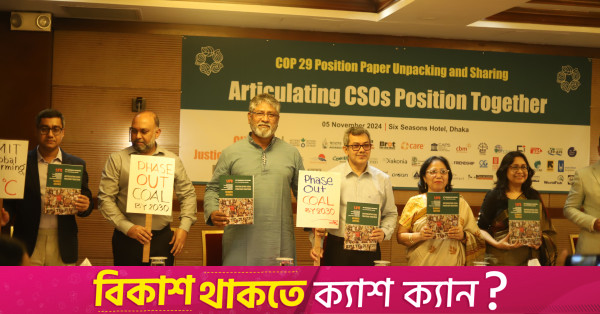Climate Justice Alliance-Bangladesh, a coalition led by Center for Participatory Research and Development (CPRD) organised an event at the Six Seasons Hotel on 4 Nov. Photo: TBS
“>

Climate Justice Alliance-Bangladesh, a coalition led by Center for Participatory Research and Development (CPRD) organised an event at the Six Seasons Hotel on 4 Nov. Photo: TBS
Civil society organisations (CSOs) have demanded a loss and damage response fund at an annual scale of $400 billion beginning in 2025 and scaling up to $1-2 trillion.
Yesterday, the Climate Justice Alliance-Bangladesh, a coalition of 40 civil society organisations led by Center for Participatory Research and Development (CPRD) organised an event at the Six Seasons Hotel in Dhaka.
At the event, “COP29 Position Paper Unpacking and Sharing: Articulating CSOs Position Together”, Chief Executive of CPRD Md Shamsudohha explained the key issues of the upcoming COP29 and presented the alliance’s key demands.
He said, “The COP29 will carry on the legacy of past climate negotiations. We expect actionable decisions on implementing the Paris Agreement and the Convention crafted by the COP.”
Shamsudohha, also coordinator of the Climate Justice Alliance, demanded a new finance target to replace the $100 billion annual target with need-based, predictable financing for climate-vulnerable developing countries to transition from fossil fuels and enhance resilience to climate change.
He demanded both quantity and quality of climate finance, and the NCQG must establish a robust monitoring, reporting, and verification (MRV) indicator.
However, he also denied the vague language “New Vision and Operational Model” mentioned during COP27, which allows for broad interpretation and lacks specific criteria.
He added that at COP29, developed countries must pledge new funding to the FRLD and ensure its swift operationalization to support economic and non-economic loss and damage.
“COP28 in 2023 emphasised transboundary adaptation through collaboration, knowledge sharing, capacity building, data exchange, and modernising early warning systems for climate risks.”
He demanded a binding international regulation or framework under the ‘Global Goal on Adaptation’ to advance negotiations on transboundary climate adaptation.
He cited a few examples, such as ‘the Indus Waters Treaty’ and ‘the Mekong River Commission.’
Also present at the event, Talha Jamal, country director of the Islamic Relief Bangladesh said, “CSOs have crucial roles in ensuring climate justice for those most at risk from climate change. I appreciate the proposed recommendations.”
Shaheen Anam, executive director of MJF, said the Multilateral Development Banks (MDBs) should focus on creating a just and equitable financing system for mitigation, adaptation, and loss and damage rather than merely increasing private finance mobilisation or burdening vulnerable countries with loans.
The MDBs and international financial institutions (IFIs) must reform their practices to align and scale up funding, simplify access, and mobilise climate finance from diverse sources, he added.


